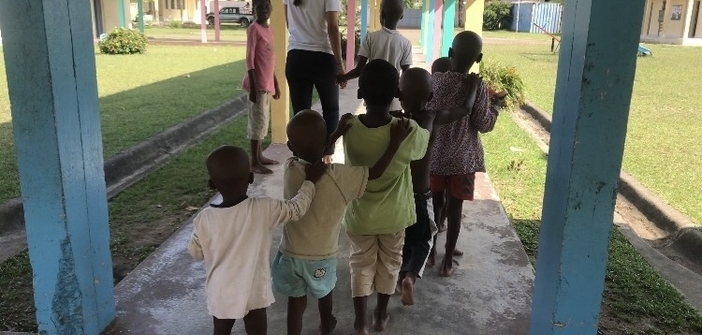Three students have a project to volunteer with underprivileged children in Libreville, Gabon. They are working in collaboration with the Elat association. Here is the story of their first day:
“This is the shelter for children in social difficulty. Here, it’s rice and chicken every day and coffee with bread and mold on top,” comments Frédéric, holding Aunt Olga’s phone. Video mode is on, he films the surroundings and explains the reality of the place, his reality. Delighted to see us, the five children immediately give us three nicknames. Only Sylvie’s first name is spared. Manon becomes Aunt Olga and Anne-Lise becomes Aunt Leïla. “Auntie, I want the game too!” exclaims Frédéric, the most energetic. A card game and the children become crazy. It’s worth mentioning they don’t have much here. The bare minimum. A large kitchen with a big sink and a few tables, a dormitory, showers, and a room where the children can watch MTV Trace.
First Approach
The children at the center are orphans or come from immigration. They are taken in to be protected from trafficking, a world in which they could have become sex slaves or maids. “The parents sell them and promise them a better life,” explains Kelia Gracia, the creator of the Elat association. She works within the Angondgé Reception Center but does not own it. Several people work there. Every day, specialized educators take turns. The children arrive at the Center without family and without papers. They have no first name or date of birth. They are given unusual names: “Joy,” “Love,” “Happiness,” “Tic-Tac”… The children often wear clothes that are too big. The youngest have full diapers and are not changed. They walk barefoot. Some eat fallen fruit leftovers off the ground. Others put bits of paper found in the grass into their mouths.
Our mission is to play with them. We try several approaches. Sylvie leads the younger ones in a caterpillar line to the other end of the Center. They sing in unison: “The train starts beep beep beep.” We try “One, two, three, sun,” without much success. Dancing? Neither. The children are quite scattered. What amuses them the most is taking our belongings. Little “Joy” does not hesitate to rummage through pockets to get a phone or to pull Aunt Leïla’s glasses.
The Gossipers*
Outside, the temperature is around 30 degrees, feeling like 33. Under a kiosk at the back of the large garden, three women are sitting on a bench: nannies supposedly in charge of the little ones. Among them, two disabled children lie on the ground. A tiny mat is there, placed without much use. They crawl, limited by the extent of their movements. No one takes care of them. The nannies are too busy gossiping. Snack time approaches. The children cannot resist the delicious local fruits: watermelons and bananas, apples for the most indulgent. Everyone rushes to the bounty of food. Hands reach out. Each one asks for more. The ladies give orders comfortably seated. They even forbid giving extra portions to children already served to prevent them from needing to go to the toilet. But the little ones are cleverer and outsmart the aunties: they hide their pieces of apple behind their backs and pretend not to have received any.
Manon François
Anne-Lise Tricoche


